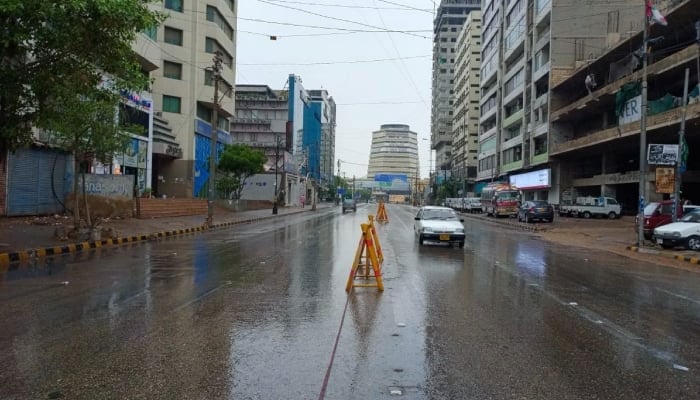Karachi likely to receive monsoon rains in July
Pakistan expected to see commencement of monsoon season from June 27 to July 4, says weather expert
KARACHI: Southern parts of Sindh, including Karachi, area expected to receive "more than usual" monsoon rains this year which is likely to start from first week of July, weather experts told Geo News.
The weather analysts predicted the arrival of monsoon season in Karachi in early July under "a medium-level pressure over the Arabian Sea" likely to be created on June 30.
A medium-level pressure is expected to be created over the Arabian Sea on June 30 which would result in the first spell of downpour to the port city in the first week of July, an analyst said.
The monsoon season will commence from June 27 to July 4 across Pakistan, whereas, the experts forecast “more than usual rains” in southern areas of Sindh, including Karachi this year.
However, the expert termed it a "long-term forecast" which could further change in future.
Earlier, the Pakistan Meteorological Department (PMD) stated in its daily forecast that mainly very hot and dry weather is expected in most plain areas of the country during the daytime.
However, gusty winds and windstorms with isolated rain-thunderstorms are expected in northeast Punjab, Islamabad, Potohar region, upper Khyber Pakhtunkhwa, Kashmir and Gilgit-Baltistan during evening night.
It also predicted that some areas of Karachi would experience drizzle late Wednesday night, however, the weather in the port city is expected to remain hot and humid during the next 24 hours.
'Below-normal rainfall' in India
On the other hand, India is likely to receive below-normal rainfall in June due to slow progress which raised concerns for the agricultural sector of Asia's third-largest economy.
Summer rains, critical to India’s economic growth, usually begin in the south around June 1 before spreading nationwide by July 8, allowing farmers to plant rice, cotton, soybeans and sugarcane.
The country is most likely to receive below-normal rains, or less than 92% of the long-period average rainfall, the state-run India Meteorological Department (IMD) said in a statement.
India has received 20% less rainfall than normal since June 1, according to data compiled by the IMD, with almost all regions except for a few southern states seeing shortfalls and some northwestern states experiencing heat waves.
The monsoon is the lifeblood of the nearly $3.5-trillion economy, bringing nearly 70% of the rain India needs to water farms and refill reservoirs and aquifers.
With additional input from Reuters
-
Security forces gun down 30 terrorists in multiple IBOs in KP: ISPR
-
MQM-P calls for new province in Sindh
-
US report validates Pakistan military edge over India: PM
-
Banned TTP poses serious threat to Pakistan security: UNSC panel
-
CM Afridi clarifies remarks on by-poll after ECP requests army deployment
-
Dubai sees 3.2m Pakistani passengers in 2025 as airport sets new milestone
-
Security forces kill 23 Indian proxy terrorists in KP's Kurram
-
Pakistan to construct island to boost oil exploration: report












